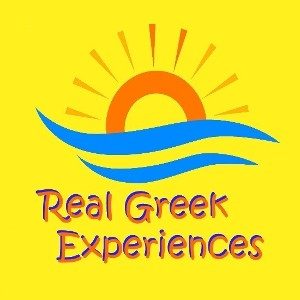You probably know that the Olympic Games started in Ancient Greece. Do you know much about the origins of the Olympic Games though? Here are some useful insights!

What are the Origins of the Olympic Games?
Every four years, we all follow the world’s biggest sports event, the Olympic Games. Here’s some insight on the origins of the Ancient Greek Olympic Games, and how they compare to the modern ones.
The contemporary event is a lot bigger than the original Olympic Games. While they are not exactly comparable, they have one thing in common. The ancient and modern Olympic Games are the biggest athletic events in the known world.
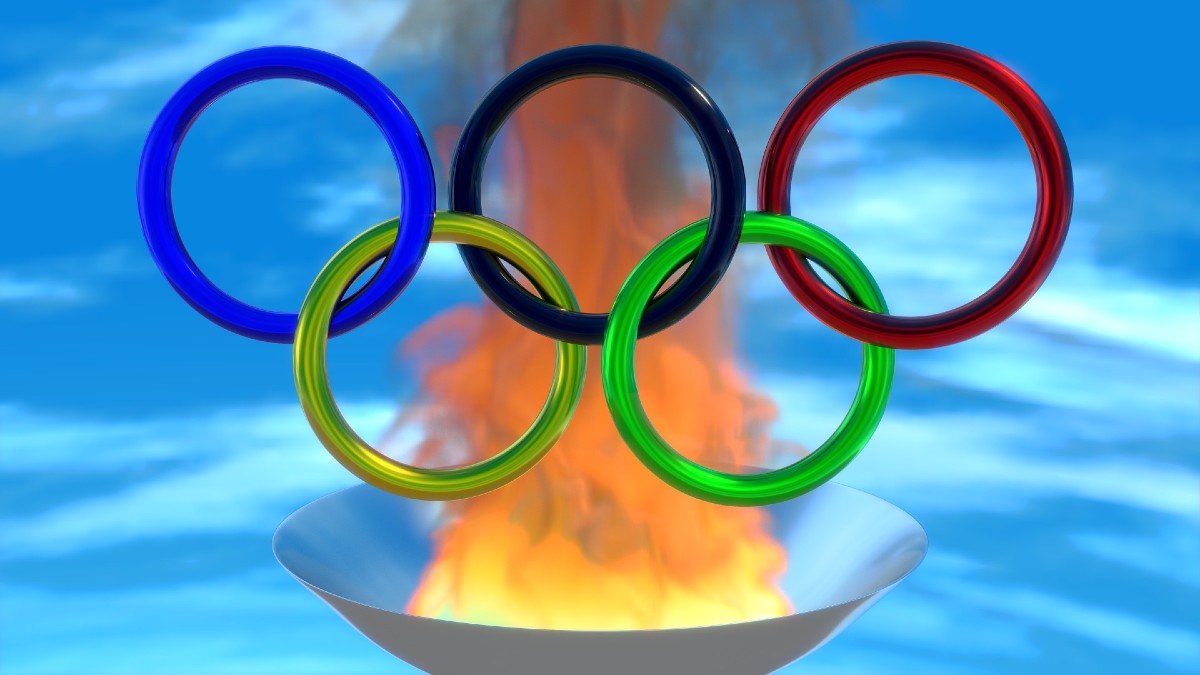
How did the original Olympic Games in Ancient Greece begin though?
The first Ancient Olympic Games were held in 776 BC in Ancient Olympia, in the Peloponnese. While initially they were a one-day event consisting of races, they gradually became much larger.
There are different myths and legends as to why and how the Olympic Games were first organized. Here are some of the most popular ones, along with a comment or two from me.
I am far from an expert in Ancient Greek mythology and history, but seriously, some of these stories are just bizarre!
The legend of Zeus and the Idaean Dactyls
According to the great Greek geographer Pausanias, the Games were first organized after Zeus was born to Kronos and Rea. Kronos wanted to eliminate Zeus, fearing that his son would want to overthrow him when he grew up.
To avoid this, Rea took baby Zeus to mount Idi, in Crete. This is where five brothers, known as the Idaean Dactyls, lived, and Rea put them in charge of raising Zeus. One of the places where Zeus spent some time during his childhood is Diktaion Andron cave, also in Crete.

In an attempt to keep the young god entertained, the brothers organized a race between them. The contest was held in Ancient Olympia – this is nowhere near Crete, but it’s a minor detail!
It was the oldest brother, Heracles, who set the location and the dimensions of the racing stadium. At the end of the race, the winner was crowned with an olive wreath.
This is Pausanias’ version of how the Olympic Games were born. Zeus became the King of Gods, and the Games were held in his honour. The olive wreath became a symbol for peace.
Note – this Heracles is not to be confused with the mythical Hercules who is famous for the twelve labours. As for the length of the stadium, it was set at 192 metres, or the equivalent of 600 Greek feet.
{Assuming that Heracles used his own foot to calculate distances, we can easily calculate that his foot was 32 cms. If Heracles was around today, his shoe size would be a European 48.5… heh!}
The macabre story of Pelops, the mythical king of the Peloponnese
Another legend on the origin of the Olympic Games talks about Pelops, one of the mythical kings in the Peloponnese.
Pelops has a very macabre background. His father, Tantalus, who lived somewhere in today’s Turkey, was a son of Zeus himself. As he wasn’t sure whether the gods were omniscient, he decided to put them to a test.
For this reason, he chopped his son Pelops into small pieces, cooked them, and offered them to the gods. Yikes! Unsurprisingly, none of the gods accepted to eat the morbid dish.
The only exception was Demeter, who had a small piece, but there was a reason for it. She was mourning her daughter Persephone’s death, so she was probably a little absent-minded.
Eventually, the gods put Pelops back into one piece, and exiled his father to Greece for trying to trick them.
Pelops went along, and found himself in a town called Pisa, a few kilometres from Olympia. There, he challenged king Oenomaus to a horse race, and won.
His trophy was the king’s daughter, Hippodamia, who had fallen in love with him. Pelops became the king of the Peloponnese, and this beautiful region of Greece was named after him.
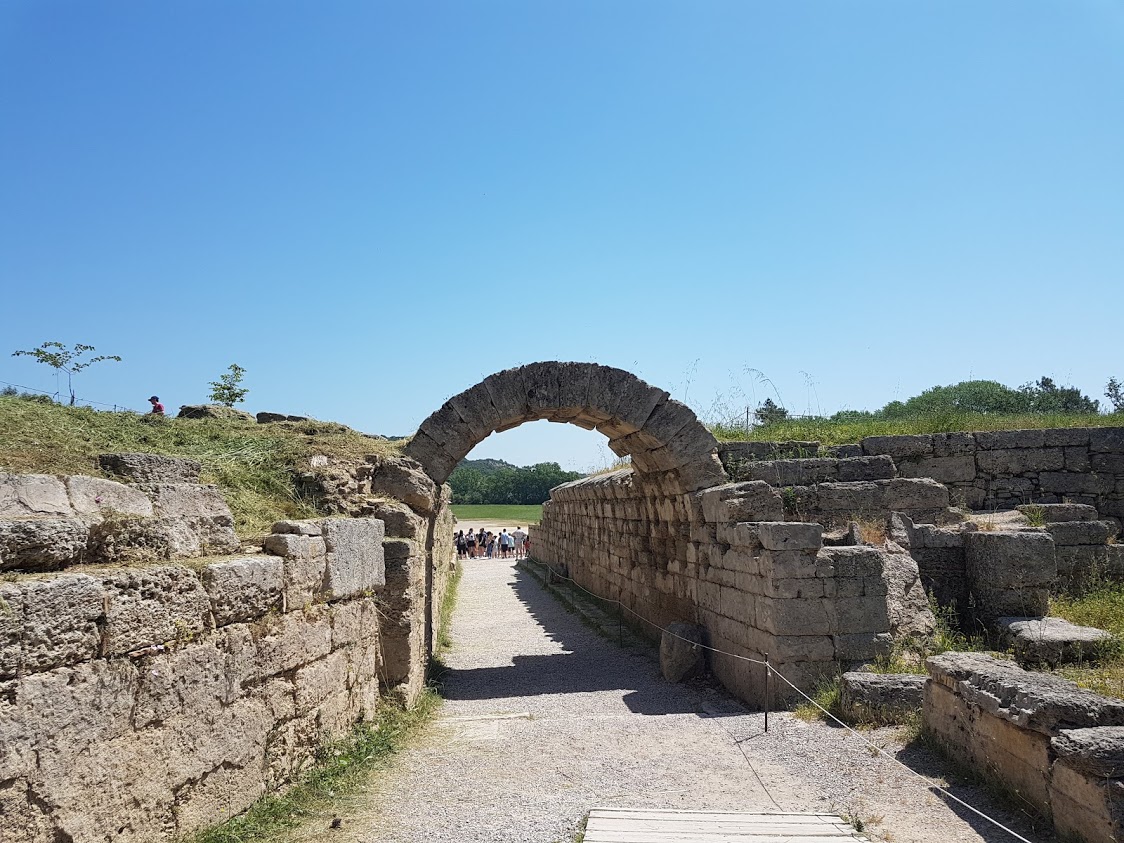
To honour the gods, Pelops continued organizing chariot races, and introduced more athletic events. These were eventually called “the Olympic Games”.
Was the legendary Hercules involved in the Olympic Games?
There is another theory, according to which the mythical Hercules was involved in starting the Olympic Games. Hercules was a demi-god, the son of Zeus and Alcmene, a mortal woman.
In fact, Zeus had tricked Alcmene into sleeping with him, taking the form of her actual husband, Amfitryon. In case you didn’t know, Zeus was very fond of women (and men), and was far off from being a faithful husband to his wife Hera.
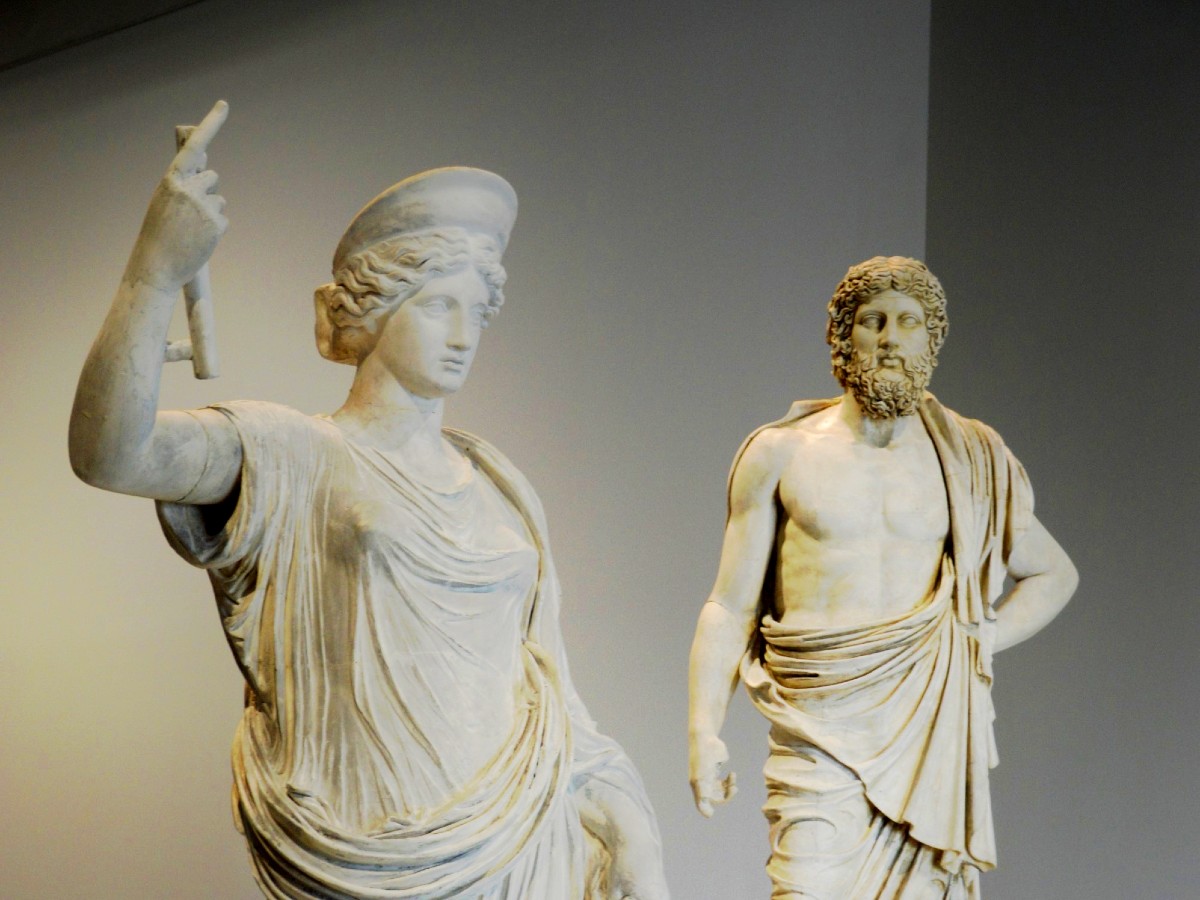
When Hercules was born, Hera was very jealous of her husband’s endless infidelity. She sent two snakes to the baby’s cradle in order to kill him, but Hercules managed to exterminate them. It was obvious that he was going to be a very strong man one day!
Unfortunately, this was not the end of Hera’s jealousy. When he grew older, Hercules got married to Megara, the daughter of the king of Thebes.
They had several children together and would have lived a happy life, if it wasn’t for Hera. She brought madness upon Hercules, who eventually killed his wife and children.
The only way to purify himself of this sin, was to serve the king Eurystheus for 12 years. Hence the 12 labours of Hercules.
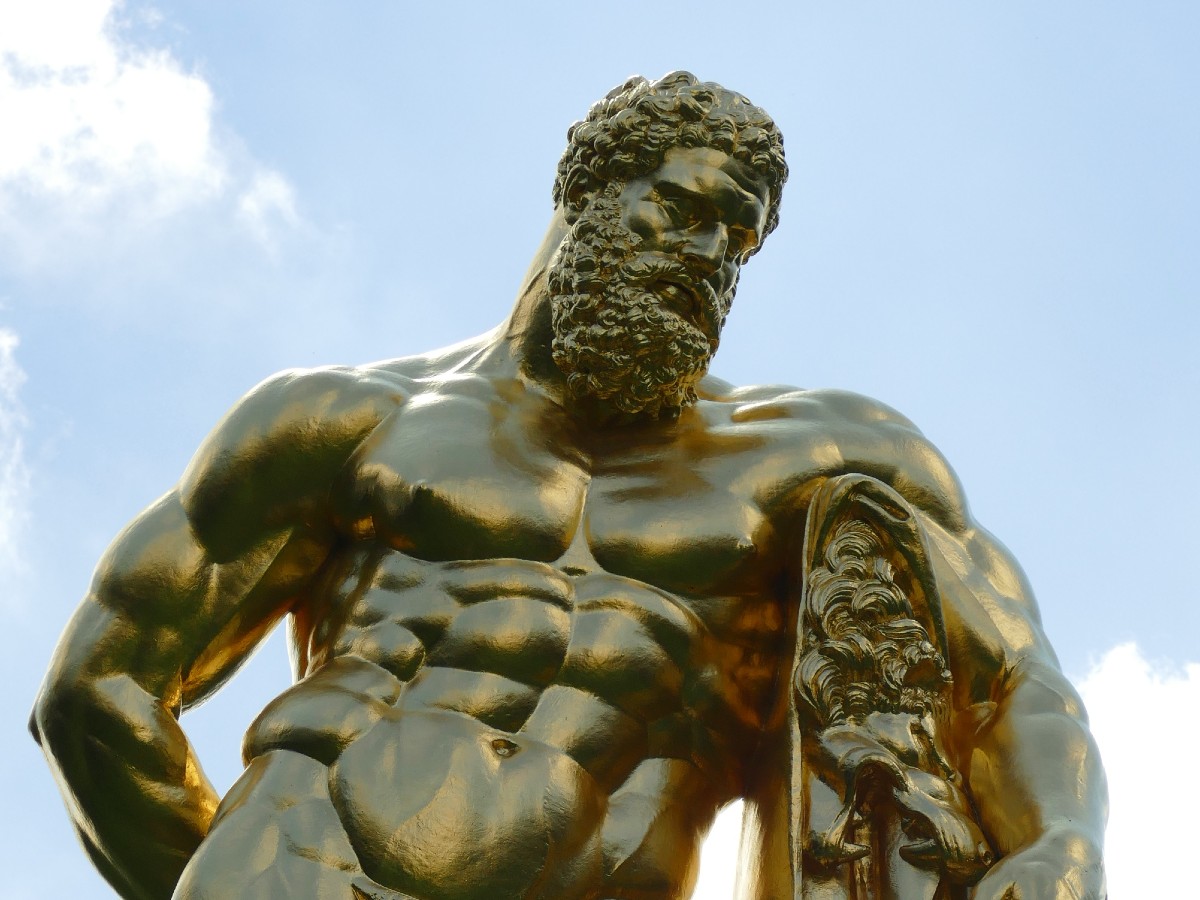
According to the ancient Greek lyric poet Pindar, Hercules established the Olympic Games after he had completed his 12 labours. The purpose of the Games were to honour his father, Zeus.
Another theory, however, suggests that Hercules only revived the Games, which had originally been established by Pelops.
The importance of the ancient Olympic Games
There may be more similar theories on the origins of the Olympic Games in Ancient Greece, including several mortals and immortals. What is common in all these legends, however, was the purpose of the Games.
This major event was organized in order to honour the gods, and Zeus in particular. Whether any of these stories are based on facts or they are pure fiction, is another matter!
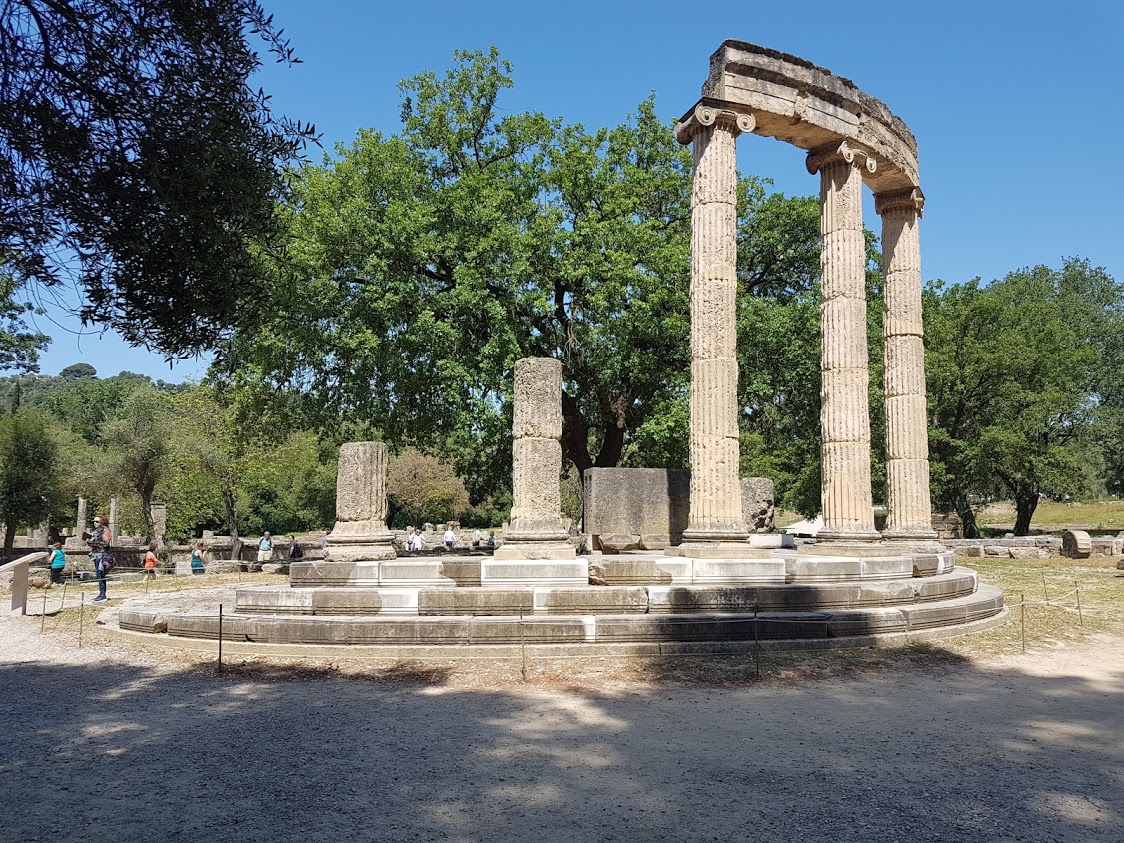
We can see from the above that the Games were intricately linked to religion and worship. They were tied to all aspects of the ancient Greek culture, where the gods played a very important part.
We also need to keep in mind that in Ancient Greece, sports were an essential part of a man’s education. A healthy mind could only grow in a healthy body.
In every Greek city-state, the palaestras and the gymnasia had equal importance with the Agoras and the temples.
Many of the prominent ancient Greeks, such as Socrates, Aristotle and Plato, taught in the gymnasia. The youth were educated in the arts, philosophy, music and athletics, and healthy competition with each other was encouraged.
How were the Olympic Games organized?
Now that we’ve talked about the origins of the Olympic Games, let’s explore how they were organized.
As mentioned earlier, the first Olympic Games were held in Ancient Olympia, in 776 BC. From then on, the Games were held every four years. Like the contemporary Olympics, they were always held in summer.
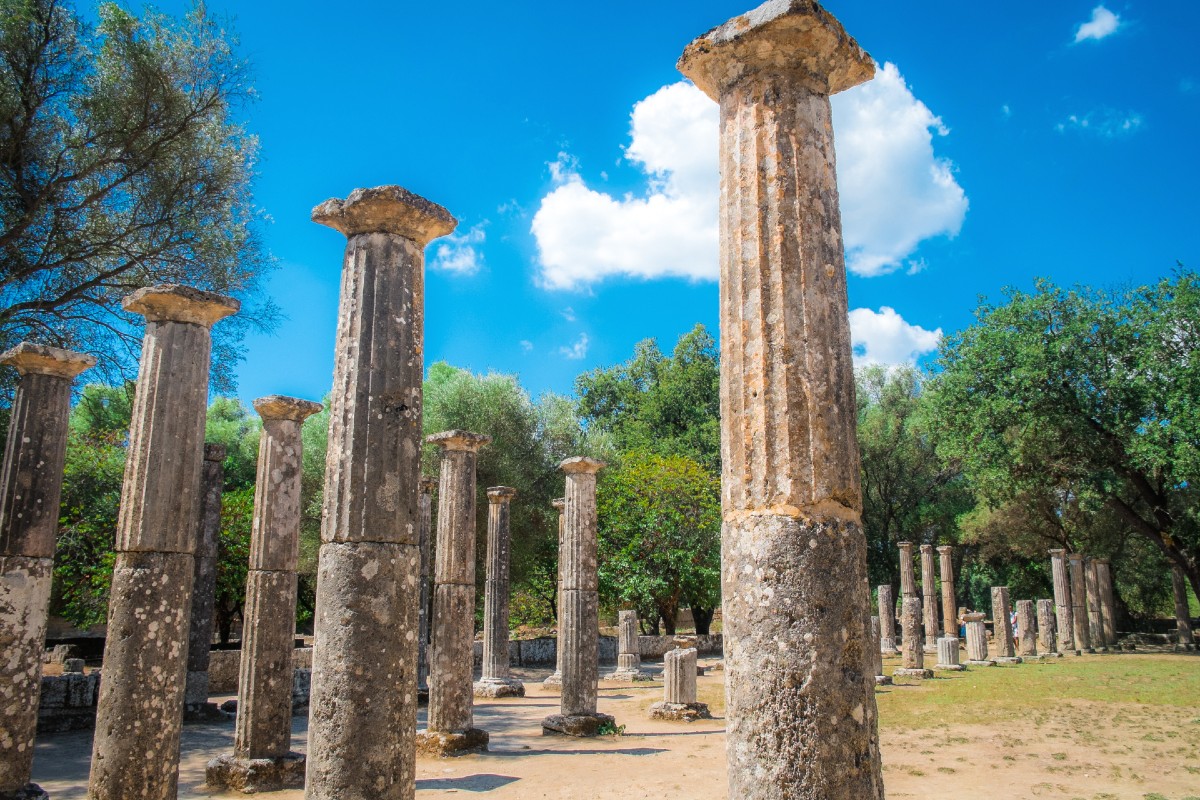
During that time, a truce was established between all city-states, even at times of war. This truce was called “Ekehiria”, and it enabled travellers to reach their destination safely.
Olympia and the wider area of Elis were neutral grounds. They served as a sacred space, where peace, freedom, equality and respect prevailed.
The four-year period between two Games was extremely important for the athletes. This was the time they could use in order to prepare for the next Games.
Winning an Olympic event was the utmost honour for athletes. As the champions returned to their cities, it was common for the residents to destroy the city walls. This was an indication of how safe the people felt, living in the same area with an Olympic champion.
The Games were last held in 393 / 394 AD, and there is some argument about how exactly they were stopped. It had been universally accepted that it was Emperor Theodosius who banned them, but this theory has recently been debated.
Eitherway, it makes sense that this “pagan” and “barbaric” tradition didn’t fit in well with the newly established Byzantine Empire.
The Buildings and Temples in Ancient Olympia
An ancient temple dedicated to Mother Earth existed in Olympia a long time before the first Olympics were held. There was also an early temple of Hera, built around 1100-1000 BC.
Additionally, Kronos, Zeus’ father, was worshipped here before he was overthrown by his son.

As the Games became more and more important, new temples and other buildings were constructed. A massive temple dedicated to Zeus was built in 470 BC, to honour the king of the Olympian gods.
This temple served as a model for other Doric temples that were built all around Greece.
There were a few more temples, as well as sanctuaries and bronze statues dedicated to the gods. Other buildings in Ancient Olympia included
- The bouleuterion, where the athletes were registered and took the Olympic oath
- The prytaneion, the administrative centre for the Olympic Games
- The covered gymnasium and the palaestra, where the athletes trained
- The Leonideo, where the officials stayed during the Games, and other guesthouses
- The nymphaeon, the ancient aqueduct
- The baths
- Phidias’ workshop – more on this below
One of the most important spaces in Olympia was the grand Ancient Olympia Stadium. As mentioned earlier, it was 192 metres long, while its width was 28 metres. Unlike the Panathenaic Stadium in Athens, there were no seats, so the audience sat on the ground.
There was also a hippodrome in Ancient Olympia, where chariot and horse races were held. Sadly, it hasn’t been excavated.
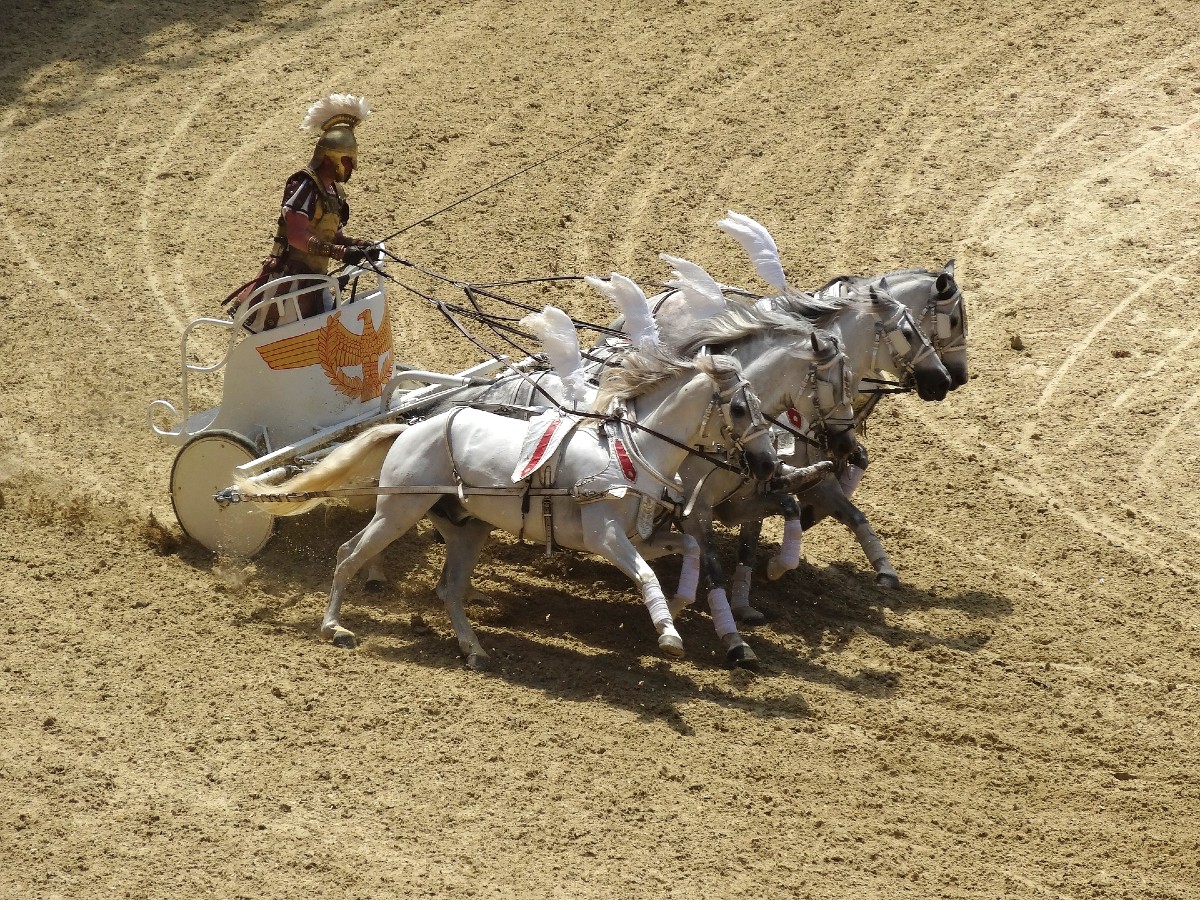
So, as you can imagine, a whole city was built around this unique event, which only happened once every four years!
When you visit Ancient Olympia today, you can see many of the ancient ruins. The excellent museums host many of the items that were excavated.
The statue of Zeus in Ancient Olympia
A few decades after Zeus’ temple was built, it was decided to also construct a statue in his honour. For this purpose, the Athenian sculptor Phidias was summoned.
Phidias had already designed the majestic chryselephantine (gold-and-ivory) statue of Athena, placed inside the Parthenon. A workshop was constructed for the great sculptor in Olympia.
It took Phidias and his team a few years to finish the impressive 13 metre tall statue of Zeus. It was placed on its pedestal, inside Zeus’ temple, in 430 BC.
The statue of Zeus was one of the seven wonders of the ancient world. People travelled from far and wide to worship it, and it became an important pilgrimage of the times. Sadly, it was destroyed in the 5th century AD.
The Games in Ancient Olympia
Originally, the Olympic Games only included races. This reinforces the legend of Idaean Heracles who wanted to entertain the little Zeus. There were different races, ranging from 200 metres to about 5 kms. During those times, the Games were a one-day event.
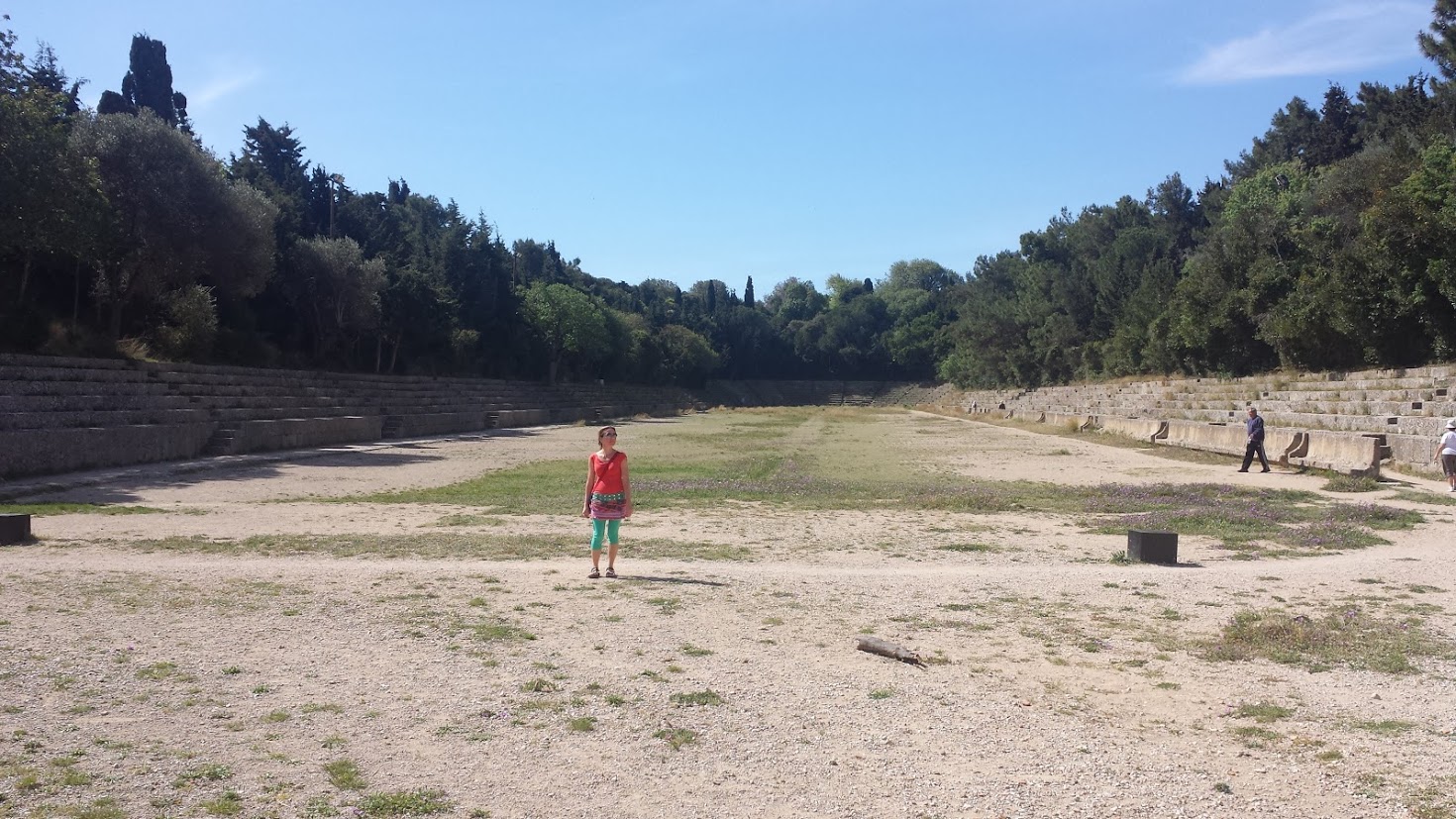
In later years, other sports were introduced, such as discus throw, javelin and long jump. Additionally, there was wrestling, boxing, and a mix of the two called pankration. This was considered to be the toughest of all sports.
The pentathlon was introduced in 708 BC, as a combination of five sports. Pentathlon athletes were considered to be among the top sportsmen of the times.
Several types of equestrian sports, both horse races and chariot races, were also established over the centuries. The Games gradually became a grand event, lasting for five days.
We mentioned earlier the concept of equality during the Olympic Games. We need to keep in mind that not all people were equal, by contemporary standards, in Ancient Greece.

Initially, the people who could participate in the Olympics were Greek people from the areas of Olympia and Elis. Later on, people from the rest of the Peloponnese were included.
During the classic years, the honour of participating in the Games was strictly reserved for Greek citizens. Only free men of Greek origin could participate, while slaves and barbarians were banned. This was gradually extended to people from all around the known Greek – and later Roman – world.
Women and the Olympic Games
Unsurprisingly, women were not allowed to participate in the Olympic Games. However, while women were not allowed to compete themselves, they could still be Olympic champions. This was in cases where they were horse or chariot owners.

The first woman champion was Kyniska from Sparta, whose horses won chariot races in 396 and 392 BC. Like every Olympian winner, she was awarded with the olive wreath.
How about the audience though? Well, anyone could attend the Games and be a part of the audience. Right? Not at all! The privilege was only reserved for men, whether they were free men, slaves, or barbarians.
Women, on the other hand, were excluded not only from participating in the Games, but also from attending!
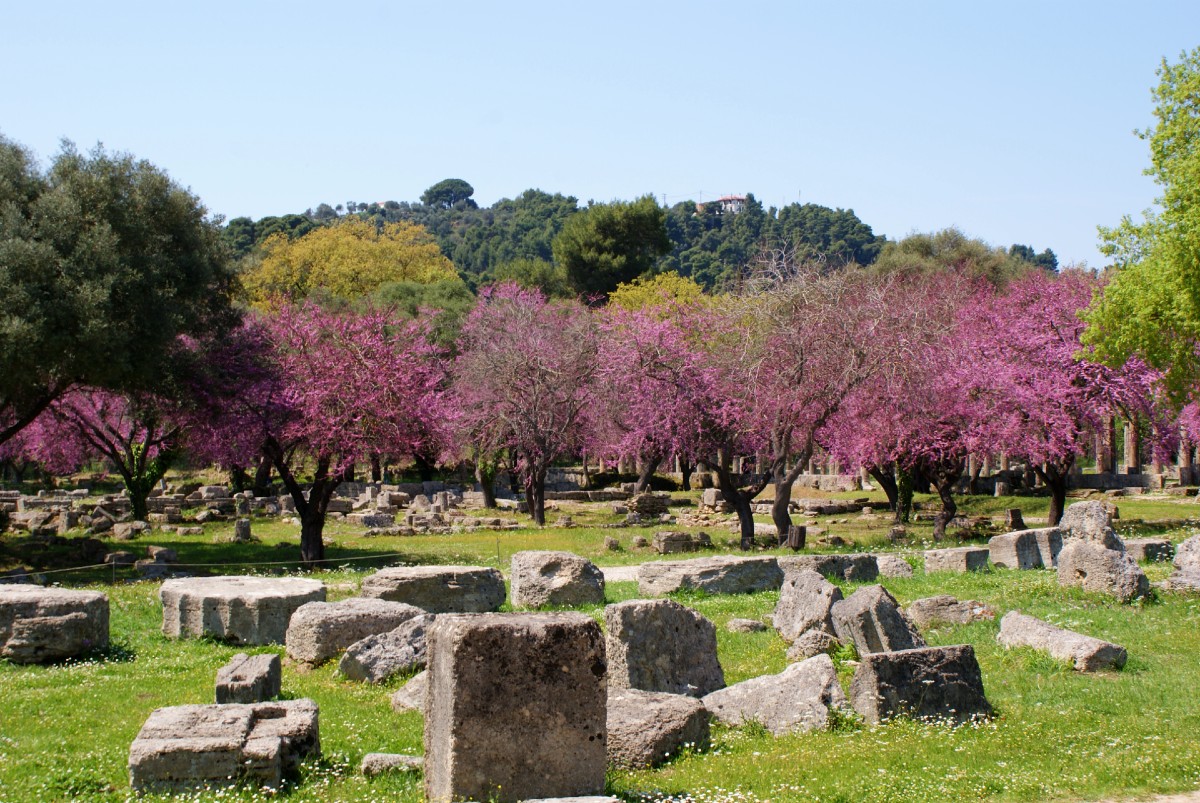
You may have heard of the famous story of Kallipateira. This was a woman who was disguised as a man in order to be able to sneak into Olympia. She was caught, and would have been sentenced to death according to the ancient laws.
Fortunately, the judges decided to make an exception, as she was the mother and sister of certain Olympic champions.
Not many people are aware of the Heraia, or Heraean Games. These were athletic events for young unmarried women. consisting of a short 160 metre race.
The women wore a short dress that would leave their knees uncovered, making it possible to run. Like the Olympics, the Heraia were held in Olympia every four years.
In fact, the Heraia may actually have been established before the Olympic Games, and possibly by Hippodamia – Pelop’s wife! This makes sense, given that the cult of Mother Earth / Hera began long before Zeus appeared in the area.
As you would expect, the Heraia were overshadowed by the male Olympic Games.
The first modern Olympic Games
So, how and why were the Games revived?
After the Athens was liberated from the Ottomans, in 1821, the ancient Greek world started being unearthed and discovered. In the late 1850s, a Greek benefactor, Vangelis Zappas, attempted to revive the Olympic Games in Athens. He organized a sports event, which was the first of a short series.
Following that, several people were involved in reviving the Games. In 1894, an International Olympic Conference was held in Paris, with the initiative of the French Baron Pierre de Coubertin. While Greece was a poor country at the time, Athens was chosen to host the first modern Games.
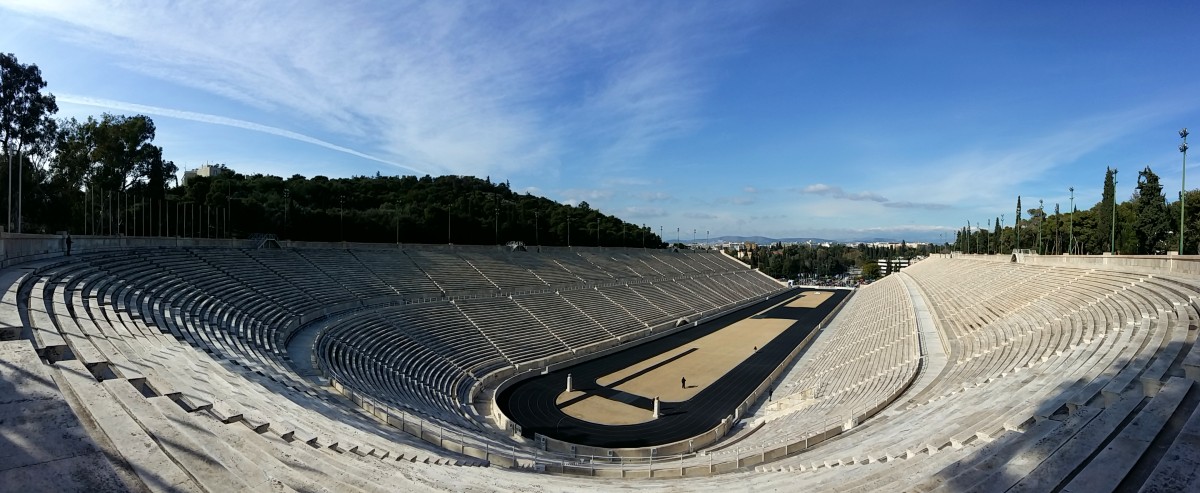
Thanks to generous funding from the benefactor George Averoff, the ancient Panathenaic Stadium was fully refurbished. It was ready to host the first modern Olympic Games, that took place in 1896.
The Games lasted for ten days and athletes competed in different sports, including the Athens Classic Marathon.
The Olympic Games today
Subsequent Games weren’t without problems. Remember the truce in ancient times, when all wars between the city-states stopped? This wasn’t the case during the first and second World Wars.
There were no Olympics in 1916, 1940 and 1944. Additionally, certain Games have been used for political propaganda, and others were boycotted by certain nations.
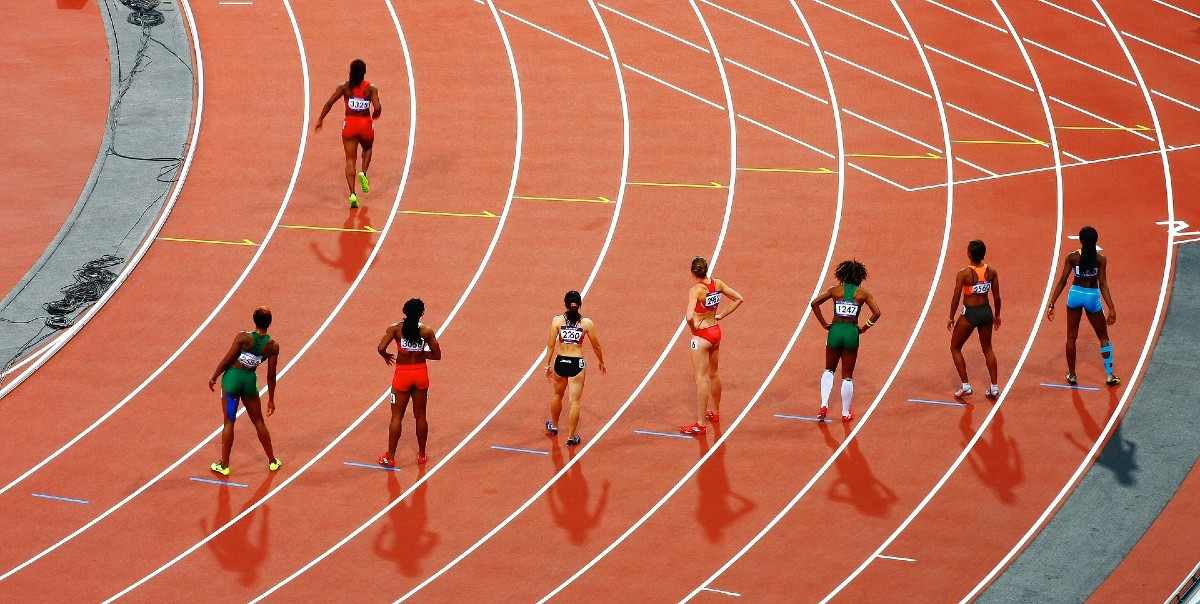
Regardless, this international event remains extremely important, interesting and entertaining. Just like in ancient times, the Games happen every four years. Thousands of contestants spend endless hours training and preparing for the Games.
These days there are Summer and Winter Games, Paralympic Games, Youth Olympic Games, and other events. Tickets for the Olympic Games may be sold out months in advance.
Billions of people all around the world watch the opening and closing ceremonies, which are normally spectacular.
It’s worth mentioning the Olympic torch relay, a tradition that was launched during the 1936 Olympic Games in Berlin. The Olympic Flame is lit in Ancient Olympia, and is then transported to several cities around Greece.
Eventually, it arrives to the Panathenaic Stadium in Athens, from where it subsequently travels to the next Olympic city. In 2024, it will travel to Paris!
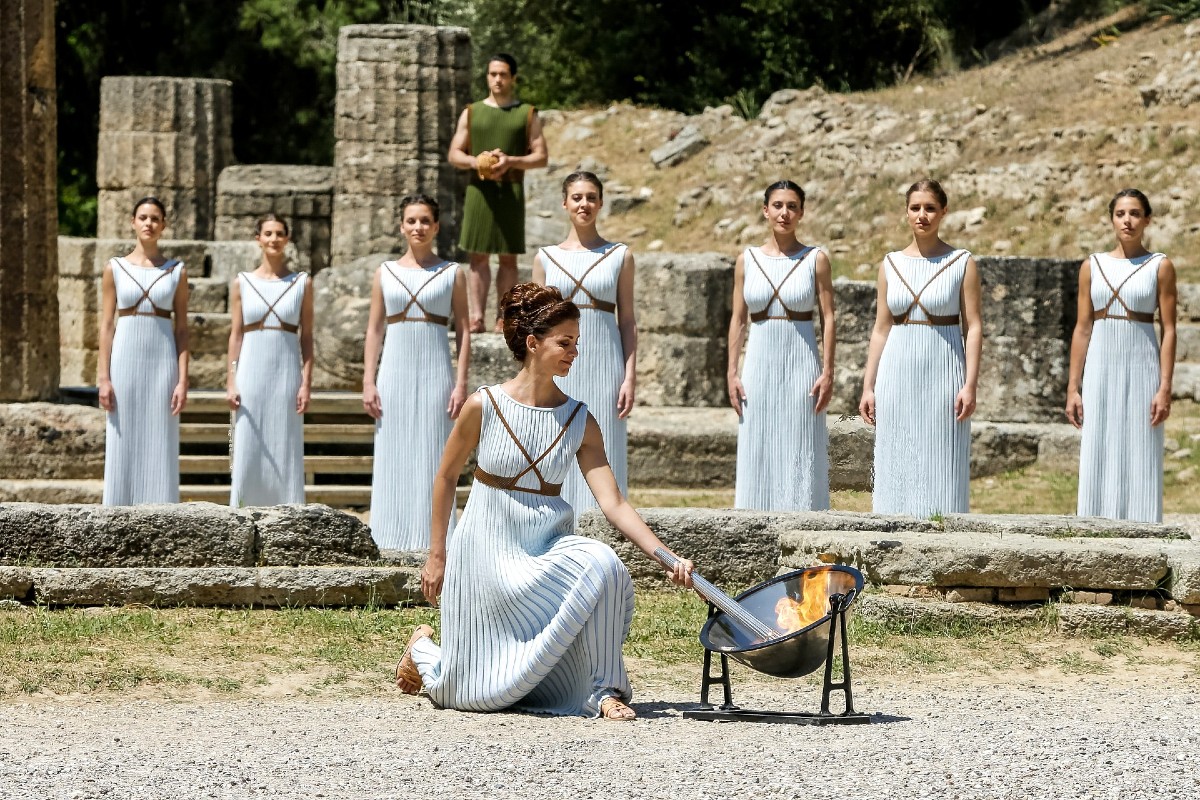
As for the site of Ancient Olympia itself, it’s one of the 18 UNESCO world heritage sites in Greece. You can visit at any time of year.
FAQs about the Olympic Games in Ancient Greece
Here are some questions people often ask about the Ancient Olympic Games:
Who started the ancient Olympic Games?
There are numerous legends explaining how the ancient Olympic Games began in 776 BC. Pausanias mentions that they were held in honour to Zeus, the King of Gods. According to another story, it was Pelops, the mythical king of the Peloponnese, who started the Games.
What is the first recorded ancient Olympic game?
The first recorded ancient Olympic game is a foot race 600 feet long, called the stadion race. The winner was a person named Koroibos, from the city of Elis.
How many ancient Olympic Games were there?
There are 293 recorded Olympiads in ancient times. The first one was held in 776 BC, and the last one in 393 – 394 AD.
What event took place in the ancient Olympic Games?
Originally, the only event that took place in the ancient Olympic Games was the stadion foot race. Gradually, other sports were added, such as more foot races, wrestling, the pentathlon, boxing, pankration and chariot races.
Why were the Olympic Games created?
The Olympic Games were created as a tribute to Zeus, the king of the 12 Olympian Gods. They were so important, that all warfare was paused during the Games.
The origins of the Olympic Games – Your views
What did you think of those ancient Greek legends? Pretty grim, aren’t they. If you’ve heard of another version of the origins of the Olympic Games, let me know in the comments!
You might also be interested in these other posts about Greece:
- Popular Name Days In Greece – An insight into Greek culture
- Athens 3 Day Itinerary – How to spend 3 days in Athens
- Best things to do in Andros Greece | Greek Island Travel
- Best things to do in Tinos Greece

Hi and welcome to my blog! I am Vanessa from Athens Greece, and I love helping people discover more about my country. In recent years, I’ve been reading more and more about our ancient past, and I find Greek history fascinating. Especially the details we were never told at school 🙂 I hope that this article will inspire you to do your own research about the origins of the Olympic Games in Ancient Greece!
